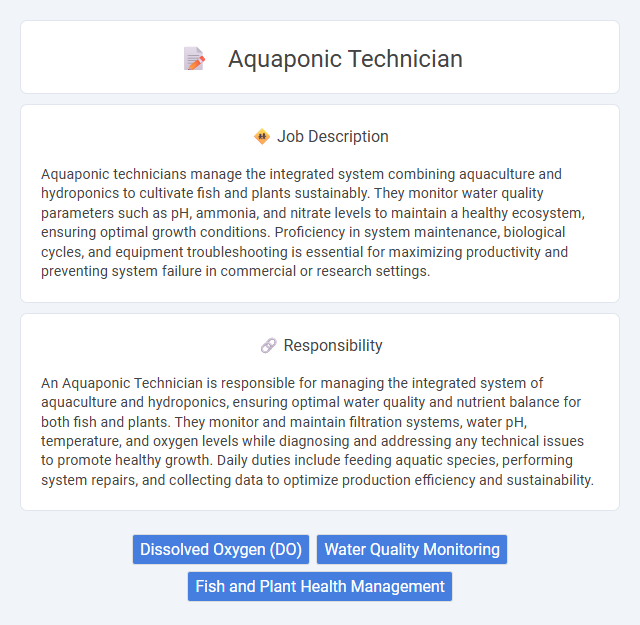
Aquaponic technicians manage the integrated system combining aquaculture and hydroponics to cultivate fish and plants sustainably. They monitor water quality parameters such as pH, ammonia, and nitrate levels to maintain a healthy ecosystem, ensuring optimal growth conditions. Proficiency in system maintenance, biological cycles, and equipment troubleshooting is essential for maximizing productivity and preventing system failure in commercial or research settings.
People with a strong interest in sustainable agriculture and hands-on work are likely to be well-suited for an aquaponic technician role. Individuals who enjoy problem-solving and working in controlled environments may find this job fulfilling and compatible with their skills. Those who prefer outdoor, traditional farming methods or dislike routine inspections of water quality and system maintenance might find this position less suitable.
Qualification
Aquaponic technicians require a strong background in biology, aquaculture, and hydroponics, often supported by a degree in agricultural science or environmental technology. Proficiency in water quality management, fish health monitoring, and plant nutrient cycles is essential for maintaining system balance and productivity. Hands-on experience with aquaponic system setup, troubleshooting, and data analysis enhances job performance and career advancement opportunities.
Responsibility
An Aquaponic Technician is responsible for managing the integrated system of aquaculture and hydroponics, ensuring optimal water quality and nutrient balance for both fish and plants. They monitor and maintain filtration systems, water pH, temperature, and oxygen levels while diagnosing and addressing any technical issues to promote healthy growth. Daily duties include feeding aquatic species, performing system repairs, and collecting data to optimize production efficiency and sustainability.
Benefit
Working as an aquaponic technician potentially offers significant benefits such as gaining hands-on experience with sustainable agriculture practices and advanced hydroponic systems. There is a strong probability of developing specialized skills in fish and plant health management that may enhance career opportunities in the growing field of eco-friendly food production. Job roles might also provide the advantage of contributing to environmental conservation and resource-efficient farming methods.
Challenge
An Aquaponic technician will likely face the challenge of maintaining the delicate balance between aquatic life and plant health to ensure a thriving ecosystem. Troubleshooting water quality issues and system malfunctions may frequently require rapid problem-solving skills and adaptability. This role probably demands continuous monitoring and adjustment to optimize nutrient cycles under changing environmental conditions.
Career Advancement
An Aquaponic Technician plays a crucial role in managing integrated fish and plant farming systems, blending aquaculture and hydroponics expertise. Career advancement opportunities include progressing to roles such as Aquaponics Manager, Environmental Consultant, or Sustainable Agriculture Specialist, leveraging technical knowledge and system optimization skills. Expertise in water quality management, system design, and sustainable practices enhances prospects for leadership and specialized consultancy positions within the aquaponics and broader agricultural industry.
Key Terms
Dissolved Oxygen (DO)
Aquaponic technicians monitor and manage Dissolved Oxygen (DO) levels to ensure optimal fish health and plant growth in integrated aquaculture systems. Maintaining DO concentrations between 5 to 7 mg/L prevents hypoxia, promotes nutrient cycling, and supports aerobic bacteria crucial for biofiltration. Advanced sensors and aeration systems are utilized to regulate DO, directly impacting aquaponic system efficiency and sustainability.
Water Quality Monitoring
Aquaponic technicians specializing in water quality monitoring ensure optimal nutrient balance and pH levels crucial for plant and aquatic life health. They utilize advanced sensors and testing equipment to track ammonia, nitrate, dissolved oxygen, and water temperature, preventing toxic buildup and promoting efficient biofiltration. Maintaining consistent water parameters directly supports system sustainability and maximizes crop yield in controlled aquaponic environments.
Fish and Plant Health Management
Aquaponic technicians specialize in maintaining optimal fish and plant health by monitoring water quality parameters such as pH, temperature, and ammonia levels to prevent disease and promote growth. They implement integrated pest management and biofiltration techniques to ensure a balanced aquatic ecosystem that supports nutrient exchange between fish and plants. Regular health assessments and the application of organic treatments help sustain high-yield production in aquaponic systems.
 kuljobs.com
kuljobs.com